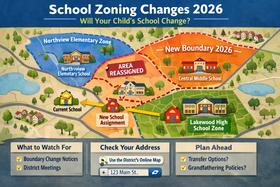Shades Valley Technical Academy in Birmingham, Alabama, closed in 2010, previously serving grades 9–12 with an enrollment peak of 28 students and a student–teacher ratio of 7:1 in recent years.
The school's graduation rate declined from 94% in 2019 to 83% in 2023, consistently below the state average which ranged from 88% to 90%.
Math proficiency fell sharply from 92% in 2012 to 10% in 2023, lower than the state average of 30% in 2023, indicating a significant performance decline over time.
Reading proficiency dropped from 87% in 2012 to 32% in 2022, lower than the Alabama state average of 47% in 2022.
Minority enrollment included 16 Black students and 12 White students when operational; 18% of students qualified for free lunch and 4% for reduced price lunch in the final active years.
School Overview
School Type
Grades Offered
Grades 9-12
Total Students
28 students
Total Classroom Teachers
4 teachers
School Rankings
Student-Teacher Ratio
7:1
17:1
American Indian
n/a
1%
Asian
n/a
1%
Hispanic
n/a
11%
Black
57%
32%
White
43%
51%
Hawaiian
n/a
n/a
Two or more races
n/a
4%
All Ethnic Groups
Eligible for Free Lunch
18%
56%
Eligible for Reduced Lunch
4%
5%
School Statewide Testing
School District Name
Source: National Center for Education Statistics (NCES), AL Dept. of Education
Frequently Asked Questions
How many students attend Shades Valley Technical Academy?
28 students attend Shades Valley Technical Academy.
What is the racial composition of the student body?
57% of Shades Valley Technical Academy students are Black, and 43% of students are White.
What is the student-teacher ratio of Shades Valley Technical Academy?
Shades Valley Technical Academy has a student ration of 7:1, which is lower than the Alabama state average of 17:1.
What grades does Shades Valley Technical Academy offer ?
Shades Valley Technical Academy offers enrollment in grades 9-12
What school district is Shades Valley Technical Academy part of?
Shades Valley Technical Academy is part of Jefferson County School District.
Recent Articles

Public School Open House & Enrollment Season Guide for Parents
Learn what to ask at a public school open house during enrollment season, from academics to safety, to choose the right school for your child.

School Zoning Changes 2026: How Assignments May Shift
School Zoning Changes 2026 could affect your child’s school assignment. Learn how zoning works, what is changing, and how families can prepare.

School Vouchers: Updated Pros and Cons (2025 Review)
Comprehensive 2025 analysis of school vouchers, weighing benefits and challenges for families, funding, outcomes, and policy directions.





